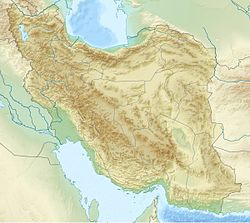| Mausoleum of Attar of Nishapur | |
|---|---|
آرامگاه عطار نیشابوری | |
 The mausoleum exterior in winter 2022 | |
| Religion | |
| Affiliation | Islam |
| Ecclesiastical or organisational status | Mausoleum |
| Status | Active |
| Location | |
| Location | Nishapur, Razavi Khorasan province |
| Country | Iran |
Location of the complex in Iran | |
 | |
| Geographic coordinates | 36°10′02″N 58°48′25″E / 36.1671°N 58.8070°E |
| Architecture | |
| Type | Islamic architecture |
| Style | Timurid |
| Founder | Ali-Shir Nava'i |
| Completed | 15th century |
| Specifications | |
| Dome(s) | One |
| Shrine(s) | One: Attar of Nishapur |
| Materials | Bricks; mortar; plaster; tiles |
| Official name | Mausoleum of Attar of Nishapur |
| Type | Built |
| Designated | 9 December 1975 |
| Reference no. | 1173 |
| Conservation organization | Cultural Heritage, Handicrafts and Tourism Organization of Iran |
The Mausoleum of Attar of Nishapur (Persian: آرامگاه عطار نیشابوری, romanized: Aramgah-e Attar; Arabic: ضريح العطار)[a] is a mausoleum, located 6 kilometres (3.7 mi) west of Nishapur, in the northeastern province of Razavi Khorasan, Iran. The complex was built by the order of Ali-Shir Nava'i in the 15th century CE, during the Tmurid era, and contains the tomb of Attar of Nishapur. It is located near the Mausoleum of Omar Khayyám.[1]
The complex was added to the Iran National Heritage List on 9 December 1975, administered by the Cultural Heritage, Handicrafts and Tourism Organization of Iran.
Overview
[edit]The structure is octagonal in shape with a tile worked onion shaped dome. It has four entrances, the northern one is the main entrance. The structure is adorned with coloured (green, yellow and blue) tiles and carvings. The interior site is covered by plaster and has four seats. The mausoleum is located in a garden covering an area of approximately 119 square metres (1,280 sq ft).[2] The grave of the well known painter Kamal-ol-molk is also situated in a part of this garden.
Gallery
[edit]- The Mausoleum of Attar of Nishapur and the Tomb of Kamal-ol-molk
- Statue of Attar, near his mausoleum
- Front view of the Mausoleum of Attar
See also
[edit]Notes
[edit]- ^ Also known as the Tomb of Attar-e Neyshabouri and the Mausoleum of Shaikh Attar Neyshaboori.
References
[edit]- ^ Rypka, Jan (1968). "Poets and Prose Writers of the Late Saljuq and Mongol Periods". In Boyle, John Andrew (ed.). The Cambridge History of Iran. Vol. 5: The Saljuq and Mongol Periods. Cambridge: Cambridge University Press. p. 587. ISBN 0-521-06936-X.
- ^ "SHEIKH ATTAR NAYSHABURI TOMB". Iran Tourism & Touring Organization. n.d. Retrieved 31 May 2025.
External links
[edit]![]() Media related to Attar Mausoleum at Wikimedia Commons
Media related to Attar Mausoleum at Wikimedia Commons


 Français
Français Italiano
Italiano











